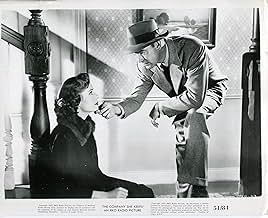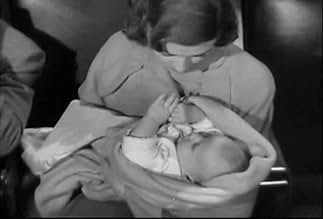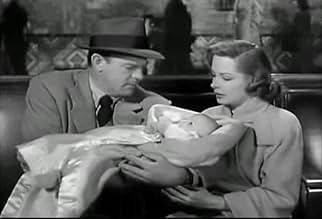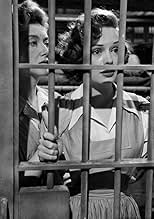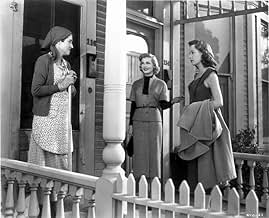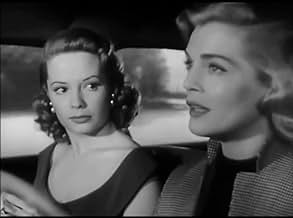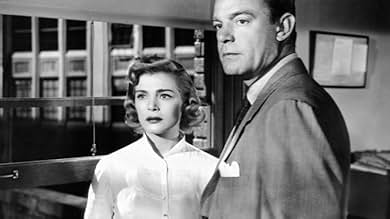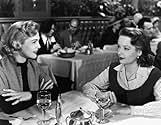AVALIAÇÃO DA IMDb
6,3/10
673
SUA AVALIAÇÃO
Adicionar um enredo no seu idiomaA female ex-convict meets a handsome man and they start dating, but she jeopardizes their relationship by not telling him that she was in prison--and he doesn't reveal his involvement with h... Ler tudoA female ex-convict meets a handsome man and they start dating, but she jeopardizes their relationship by not telling him that she was in prison--and he doesn't reveal his involvement with her parole officer.A female ex-convict meets a handsome man and they start dating, but she jeopardizes their relationship by not telling him that she was in prison--and he doesn't reveal his involvement with her parole officer.
Eric Alden
- Sergeant of Detectives
- (não creditado)
Parley Baer
- Steve
- (não creditado)
Larry Barton
- Store Detective
- (não creditado)
June Benbow
- Myrtle
- (não creditado)
Lela Bliss
- Window Shopper
- (não creditado)
Gail Bonney
- Nurse
- (não creditado)
Avaliações em destaque
In 1950 director John Cromwell made two films about women in varying degrees of incarceration, first "Caged", and then this one. "Caged", dealing with women in prison, is gritty and realistic. "Company She Keeps," about the travails of a parolee, is neither.
As a previous IMDB reviewer stated, it starts off well, with a good scene of the prisoner in front of the parole board. Jane Greer invests her inmate with an interesting combination of hardness and vulnerability and the members of the parole board react to her with, mostly, sympathy mixed in with skepticism from the lone male board member. Then there are some hard hitting scenes with Greer and her sensitive parole officer who is well played by Liz Scott. Nice to see this veteran interpreter of hardened femme fatales in a good gal role for a change and because Scott is a fine, under rated actor she plays it without undue cloyingness.
Then Dennis O'Keefe, playing Scott's newspaper columnist boyfriend, enters the picture and all believability, intensity and interest vanish as we enter the trite realm of the Hollywood Love Triangle. Ketti Frings' dialogue switches from hard edged to purple and John Cromwell's direction goes heavy on the mush and light on the harrowing, with two glorious exceptions, the shoplifting temptation sequence and the great scene in the ladies holding cell which feels like Cromwell was just aching to return to "Caged". Which begs the question, Why didn't he? (Answer below)
Bottom line: You'd think after "Caged", which did well at the box office, that Cromwell could have done a straight on story about the difficulties of parole without mucking it up with this spurious nonsense. Wonder why he did it? Maybe the guy was more commercial than artistic. Give it a C plus.
As a previous IMDB reviewer stated, it starts off well, with a good scene of the prisoner in front of the parole board. Jane Greer invests her inmate with an interesting combination of hardness and vulnerability and the members of the parole board react to her with, mostly, sympathy mixed in with skepticism from the lone male board member. Then there are some hard hitting scenes with Greer and her sensitive parole officer who is well played by Liz Scott. Nice to see this veteran interpreter of hardened femme fatales in a good gal role for a change and because Scott is a fine, under rated actor she plays it without undue cloyingness.
Then Dennis O'Keefe, playing Scott's newspaper columnist boyfriend, enters the picture and all believability, intensity and interest vanish as we enter the trite realm of the Hollywood Love Triangle. Ketti Frings' dialogue switches from hard edged to purple and John Cromwell's direction goes heavy on the mush and light on the harrowing, with two glorious exceptions, the shoplifting temptation sequence and the great scene in the ladies holding cell which feels like Cromwell was just aching to return to "Caged". Which begs the question, Why didn't he? (Answer below)
Bottom line: You'd think after "Caged", which did well at the box office, that Cromwell could have done a straight on story about the difficulties of parole without mucking it up with this spurious nonsense. Wonder why he did it? Maybe the guy was more commercial than artistic. Give it a C plus.
Parole officer (Scott) and parolee Diane (Greer) compete for the same man (O'Keefe), creating conflict on several levels. At best, the movie's about the difficulties of being on parole.
Oddball little programmer. Scott gets top billing, but as others point out, it's Greer who gets the screen time. And far from her usual slinky seductive role, she's not only de-glamorized, but also suitably dour-faced (just count her smiles; I stopped after one). All in all, it's a rather grim screenplay, drably photographed, and I can't believe the studio expected the final product to make money.
Despite the romantic triangle that strains believability, there are several striking scenes. Catch the iconic 40's diner where Diane gets her bottom-of-the-barrel meals. The sweat and steam just about drip off the wall. And that police line-up-- a graphic cross-section of the city's tough cookies, down-and-out'ers, and hopelessly pathetic (& one of the few barfing scenes from that era)-- are all herded along by a bullying cop (Freed). It's one of the more unvarnished glimpses of urban flotsam and jetsam from the period. Then there's the crowded jail cell where the camera abandons Diane (& us) to a nightmare of entrapment. It's an unnerving moment, very well done.
I would've liked the movie better had they made the triangle more credible, plus Scott's sacrificial character seems too good to be true. I expect the latter was RKO's effort at compensating for the harshness of the parole system as portrayed. Likely too, prestige producer John Houseman had something to do with the social realism phase, including the poignant overcoat episode. Anyway, reviewer bmacy's remarks on the influence of the previous year's Caged (1950) are on target. And, had this film carried through more with its realistic dimension, it might not be as obscure as it is.
Oddball little programmer. Scott gets top billing, but as others point out, it's Greer who gets the screen time. And far from her usual slinky seductive role, she's not only de-glamorized, but also suitably dour-faced (just count her smiles; I stopped after one). All in all, it's a rather grim screenplay, drably photographed, and I can't believe the studio expected the final product to make money.
Despite the romantic triangle that strains believability, there are several striking scenes. Catch the iconic 40's diner where Diane gets her bottom-of-the-barrel meals. The sweat and steam just about drip off the wall. And that police line-up-- a graphic cross-section of the city's tough cookies, down-and-out'ers, and hopelessly pathetic (& one of the few barfing scenes from that era)-- are all herded along by a bullying cop (Freed). It's one of the more unvarnished glimpses of urban flotsam and jetsam from the period. Then there's the crowded jail cell where the camera abandons Diane (& us) to a nightmare of entrapment. It's an unnerving moment, very well done.
I would've liked the movie better had they made the triangle more credible, plus Scott's sacrificial character seems too good to be true. I expect the latter was RKO's effort at compensating for the harshness of the parole system as portrayed. Likely too, prestige producer John Houseman had something to do with the social realism phase, including the poignant overcoat episode. Anyway, reviewer bmacy's remarks on the influence of the previous year's Caged (1950) are on target. And, had this film carried through more with its realistic dimension, it might not be as obscure as it is.
Scott and Greer are very good in this "woman gets out of prison" movie that could have been awful. Cromwell directs crisply and many shots are well lit and evocative. This may or may not be film-noir, depending on the viewer's perspective, but it holds up well. If you can find it on TV, it is well worth taping, since it is not easy to find on video.
Jane Greer and Lizabeth Scott star in 1951's "The Company She Keeps," directed by John Cromwell and also starring Dennis O'Keefe. O'Keefe is columnist Larry Collins involved with parole officer Joan Wilburn (Scott), who has Diane Stuart (Greer) as a client. Stuart makes a play for Collins and gets him. The two fall in love, and Joan finds out about it, making her position rather difficult.
This isn't a big movie and provides a different sort of role for Scott. Here she's a good girl with shorter hair, and she almost reminds one of June Allyson. She's quite beautiful and does a good job, though I prefer her as a '40s bad girl. O'Keefe is a serviceable leading man.
The film belongs to the fabulous Greer. In the beginning, at her parole hearing, she's shy, soft and sweet. Once she's out - whoa! The angry, bitter tough gal comes through, only showing her vulnerable side once she falls for Larry.
Worth seeing for Greer.
This isn't a big movie and provides a different sort of role for Scott. Here she's a good girl with shorter hair, and she almost reminds one of June Allyson. She's quite beautiful and does a good job, though I prefer her as a '40s bad girl. O'Keefe is a serviceable leading man.
The film belongs to the fabulous Greer. In the beginning, at her parole hearing, she's shy, soft and sweet. Once she's out - whoa! The angry, bitter tough gal comes through, only showing her vulnerable side once she falls for Larry.
Worth seeing for Greer.
The film begins with the parole board meeting at a woman's prison. They are discussing Diane Stuart's case. She's granted parole and moves to Los Angeles. Once there, she's met by her new parole officer, Joan Wilburn (Lizbeth Scott). The p.o. is VERY positive and friendly--unrealistically so, actually. She seems more like a cheerleader than an officer of the court. All this occurs while Diane acts as if she'd rather be anywhere than with Joan. Pleasant, she is not.
While Diane does okay on parole, she is a conniver. When she sees Joan with her boyfriend, Larry (Dennis O'Keefe), she decides to get him for herself and slowly he falls for her. However, unexpectedly, she falls for him as well. Here is where is gets more ridiculous--Joan isn't thrilled by all this but is super-supportive and pushes to get the pair permission to marry. As for Diane, she's broken-hearted and expects the worst. What's next?
When the film began, I loved Greer's character. She was wonderfully noir--with a bad attitude and a hard edge. But, when she suddenly actually fell for Larry AND her p.o. was so supportive, the film felt very sappy...and lame as well as VERY inconsistent. Up until then, I would have given this one an 8 or 9. How could they have screwed up so badly?!
While Diane does okay on parole, she is a conniver. When she sees Joan with her boyfriend, Larry (Dennis O'Keefe), she decides to get him for herself and slowly he falls for her. However, unexpectedly, she falls for him as well. Here is where is gets more ridiculous--Joan isn't thrilled by all this but is super-supportive and pushes to get the pair permission to marry. As for Diane, she's broken-hearted and expects the worst. What's next?
When the film began, I loved Greer's character. She was wonderfully noir--with a bad attitude and a hard edge. But, when she suddenly actually fell for Larry AND her p.o. was so supportive, the film felt very sappy...and lame as well as VERY inconsistent. Up until then, I would have given this one an 8 or 9. How could they have screwed up so badly?!
Você sabia?
- CuriosidadesAt one point, four month-old Jeff Bridges, playing the baby Jane Greer is holding in the train station, was supposed to cry. To get him to cry, Jeff's mother, Dorothy Dean Bridges, suggested they pinch him.
- ConexõesFeatured in 2019 Golden Globe Awards (2019)
Principais escolhas
Faça login para avaliar e ver a lista de recomendações personalizadas
- How long is The Company She Keeps?Fornecido pela Alexa
Detalhes
- Data de lançamento
- País de origem
- Idioma
- Também conhecido como
- The Company She Keeps
- Locações de filme
- 114-116 North Hope Street, Los Angeles, Califórnia, EUA(Diane Stuart's apartment building)
- Empresa de produção
- Consulte mais créditos da empresa na IMDbPro
- Tempo de duração1 hora 22 minutos
- Cor
- Proporção
- 1.37 : 1
Contribua para esta página
Sugerir uma alteração ou adicionar conteúdo ausente

